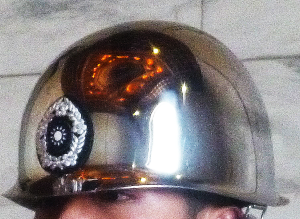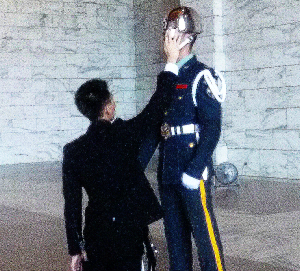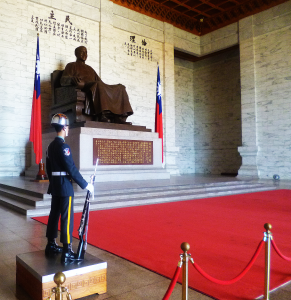Blinking on the Job Not Allowed—The (De)Merits and Bounds of Extreme Job Discipline

For the several minutes I carefully observed him, he never blinked or otherwise indicated he was not a statue. That he is required to never blink during any of his multiple 1-hour day shifts was confirmed by the onsite monitor I spoke with.
Exactly what penalties as discipline would be imposed on him or the second posted paladin were only hinted at by both his assigned “handler” (shown in the photo, right, daubing perspiration from the guard’s face) and the English-speaking volunteer guide. They suggested penalties ranging from canceled “holidays” (presumably “leave”) to something more severe, including loss of the posting altogether.
Initially, when I asked the otherwise very forthcoming guide about the penalties, he skirted the question by explaining how rigorous the screening and training processes and procedures are for appointment to this elite role, suggesting that the need for penalties simply would not arise among the select few—numbering about 10—assigned this task.
These guards, he suggested, will not sneeze, cough, twitch, fidget, yawn or even blink. In full dress, including the helmet shown, in Taipei’s humid heat, they will, of course, sweat. Hence the handler whose duties include patting them dry.
The guide’s reply to my query as to what happens if one of the guards coughs was that the soldier would be expected to report his condition prior to his shift—on the apparent and peculiar presumption that a cough could never catch an honor guard off guard, while at his post, which he occupies about 4 to 5 hours per shift, alternating every other hour.
The second honor guard was no less perfectly disciplined in posture, pose, poise and immobility. When tested to the limits by mischievous or over-zealous visitors bent on interacting with the guards to the point of distracting them, the guards have backup in the form of monitor and handler intervention.
The guide I spoke with recounted an incident with giggly and giddy Japanese girls who went so far as to paw one of the two spiffy soldiers before they were shooed away.
To confirm what I was told by the volunteer guides and the handler, I returned the next day, to monitor the performance of one of the two guards posted. To make reliable observations, I myself had to refrain from blinking, since an observed guard might blink at the same time, and therefore escape detection by me.
Timing my observation, I was quite surprised to find that for me, it was much easier to not blink in the humidity of Taipei than in the drier climate back in Canada.
At my 7-minute mark without blinking, I halted my experiment, because I thought the guard appeared to have blinked—once, but it may have been a flutter. To be fair to him, even if he had fully blinked, I don’t know how long he had been posted there, which could have been as long as 45 minutes, the other 15 minutes being allocated to the ritual changing of the guard (during which time blinking would presumably again be verboten) .
Through sheer luck in a chance conversation with Christine C. (who, like most quoted Chinese, preferred not to have her surname appear in print), a Taipei accounting consultant, she told me that her father was assigned precisely that guard duty 30 years ago and confirmed that indeed blinking was forbidden.
Follow-up conversations with yet another volunteer guide and another handler disclosed that the honor guards are not volunteers, that they have three months of comprehensive training, including endurance “training” and screening and that, the stresses of not blinking aside, the job can be otherwise grueling, e.g., one guard fainted during the previous week, from heat exhaustion.
The Merits and Demerits of Extreme Job Discipline: a Kantian Perspective
Observing the extreme discipline (as high and strict standards of consistent performance, rather than as punishment)—both that imposed and the self-imposed—left me with mixed feelings of the sort initiates into fraternities, military elites, corporate cults or gangs must have when subjected to severe hazing, arbitrary and inflexible rituals, or purely symbolic yet utterly inflexible demands for total compliance. 
On the one hand, there is a very strong case to be made for profound respect—respect for meeting the challenge of that discipline, if not for the discipline itself, and respect for the respect shown to Chiang Kai-shek, in the form of detailed and symbolic focused attention demanded by those who fervently believe he deserves that respect and the complete immobility of the guards.
On the other hand, the humanitarian rationalist Western influences in my character make me question whether risking eye damage for the sake of an imposed standard of respect is carrying things a tad far. Because it is purely symbolic discipline, quite unlike that required as essential to the operational tasks assigned missile launch officers on duty deep in U.S. silos, the no-blinking rule can come across as too extreme an interpretation of “respect”.
To adjudicate this clash of perspectives, I offer a third one:The upper limit of discipline should be defined as that point at which the discipline erodes rather than supports or strengthens job performance.
If the honor guards were to experience eye damage from their displays of unblinking obedience and respect, their capacity to perform the very task to which they have been assigned would be jeopardized, if not impaired.
Is there any risk of such damage?
Dr. Jeffrey Gold, board-certified Connecticut ophthalmologist, states, in a posted response to that question, “The purpose of the blink is to spread tears across the surface of the eye to keep it properly wet. If you can’t blink the surface of the eye can dry out causing severe infection, ulceration and even the loss of vision.”
Generalizing from its application to this honor guard instance, this rule can be applied to any organization—whether corporate, military of other non-profit: The demands of discipline must cease at the point at which they impair the capacity to carry out the tasks that the discipline is supposed to facilitate.
I regard this principle as a variation on a kind of “Kantian” imperative I propose: “Thou must not consent to anything that will impair your capacity to consent”—which is offered in the spirit of the philosophy of the 18th-century German philosopher to the extent that it and he suggest that we must avoid behaviors that, if allowed to become universal, would be self-defeating, e.g., universal lying, which would result in universal distrust and the ineffectiveness of lying as a practice and principle.
Analogously, as a general principle, consent that diminishes the capacity to consent is similarly self-nullifying and paradoxical, e.g., consenting to a lobotomy. Likewise with discipline: Disciplined performance that diminishes performance is sabotage, not true discipline.
The Drill-Sergeant Retort
The predictable retort to this line of thinking is that extreme discipline that diminishes the capacity to perform is actually a screening tool, rather than or as much as a training tool. Basically, it’s the perspective of the tough-as-leather leatherneck drill sergeant: The elimination of anyone who isn’t up to the discipline challenge and standards, and experiences job-performance capacity impairment, will not only be a result, but also a prime objective. The challenge in applying this retort is to be sure that
- Those who are eliminated are not harmed.
- Not everyone gets eliminated.
The merit of such Spartan-Darwinian discipline-based selection is directly proportional to the assurances that neither of these will happen. The task of anyone in favor of or opposed to extreme job discipline is to determine to what degree those two conditions are or are not met.

